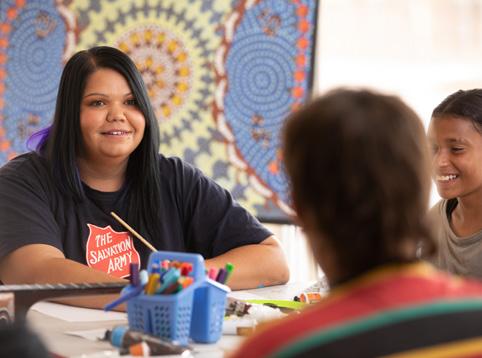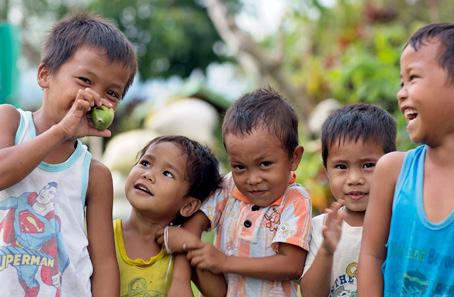
5 minute read
Mission: Community Engagement
Policy, Research and Social Justice
Policy, Research and Social Justice (PRSJ) provides support functions in advocacy and social policy, research and outcomes measurement, and the contract services related to the delivery of mission activities and data collection services.
Advertisement
Through Policy and Advocacy, The Salvation Army coordinates social policy development, social justice education, and empowerment and advocacy efforts on social policy issues. We work with corps and service areas to identify social justice issues, explore effective social policy responses and seek to influence decision-makers to make needed change that transforms Australia.
The Salvation Army also leads development of research, evaluation, and outcomes/impact measurement to provide evidence and insights about the people the movement supports, its practices, and its impact on the community. These insights inform best-practice service delivery, policy and advocacy, and can be utilised to promote the ongoing work of the Army.
KEY RESEARCH AND SUBMISSIONS (JULY 2020 TO JUNE 2021)
Research Report: The Stronger Communities project: The Salvation Army National Outcomes Measurement
The Stronger Communities project aims to measure how The Salvation Army is progressing in ‘transforming Australia one life at a time’. The report sought to know how many people are making progress, or sustaining positive outcomes because of their engagement with a Salvation Army service and with the organisation. Community members’ progress and outcomes are measured against four Stronger Communities Outcome Domains: Well-being and Spirituality; Individual Capability; Life Circumstances; and Social Connectedness. Most key service areas are developing and/or implementing their outcomes measurement tools at a national level.
FOR MORE INFORMATION, PLEASE SEE THE SALVATION ARMY IMPACT REPORT 2021, PAGE 10-13.
For those already struggling, the COVID-19 pandemic has further exacerbated experiences of poverty, hardship and housing stress, particularly for low-income earners and recipients of government benefits. As a result, many have turned to community support services for help. The Salvation Army has observed new and emerging groups of people who typically would have managed through hard times. Since April 2020, there has been an influx of international students, temporary visa holders, younger cohorts aged 18-24 years, and those renting and residing in unstable accommodation. This research project explored the impact and challenges of the COVID-19 pandemic on the financial situation and mental well-being of community members and their families. The information collated provides valuable insights and understanding of the effects of COVID-19 for our clients, and the financial implications of living on restricted incomes. It emphasises the financial stress and difficulties people experienced to afford their rent and essentials, such as household bills and enough food for themselves and their families.
Submission: Indigenous Voice to Parliament
Aboriginal and Torres Strait Islander Elders and advocacy groups have been very clear on the need for a constitutionally enshrined ‘Voice’ to parliament (most notably, but not exclusively, through the Uluru Statement from the Heart). Constitutional recognition is needed to ensure the Voice leads to justice and equality and builds trust in the process.
The Salvation Army is a strong supporter of the Uluru Statement. In this submission to the government’s consultation, the Army reiterated its longstanding position that the Indigenous Voice to parliament must be constitutionally enshrined. The submission amplified the voices of Aboriginal and Torres Strait Islander-led groups, honoured the wisdom and patience of Aboriginal and Torres Strait Islander Salvationists, and drew on the process and outcomes of the yarning circles undertaken as part of the Reconciliation Action Plan.
FOR MORE INFORMATION, PLEASE SEE THE SALVATION ARMY SUBMISSION – INDIGENOUS VOICE CODESIGN INTERIM REPORT
Submission: Increasing the JobSeeker Payment
The Salvation Army has been a leading voice in discussing the need for an increase to the JobSeeker rate for many years. This submission presented new and concrete evidence from specially commissioned research. It provided deeply human descriptions of the hardship experienced and tied to qualitative data around the experience of people the Army works with.
The submission was one part of a wider campaign around JobSeeker that is ongoing. The evidence in the submission was used as the basis for forming partnerships within the sector, media activity and direct advocacy with MPs and Senators.
FOR MORE INFORMATION, PLEASE SEE THE SUBMISSION FINAL REPORT ON THIS LINK
Resource: The Pathway to Social Justice
As part of its social justice education and empowerment practice, The Salvation Army produced the Pathway to Social Justice as part of Anti-Poverty Week advocacy.
The message is one of hope and action and focuses on the proposition that Australia should be a place where: • everyone’s basic needs are met; • everyone is welcome and included; and • everyone can have hope for the future.
The report focuses on how Australia can transform and provide practical steps for the nation, the community, and individuals to help Australia move closer to being free from hardship and injustice.
FOR MORE INFORMATION, PLEASE SEE PATHWAY TO SOCIAL JUSTICE REPORT

VIEW A COPY OF SAID 2021 ANNUAL REPORT HERE
The Salvation Army
International Development
The Salvation Army International Development (SAID) works globally in specific countries, empowering vulnerable communities to prosper in their economic, social, and spiritual lives.
SAID works in partnership with other Salvation Army territories and commands in two key areas: community development, and supporting The Salvation Army mission work globally through mission support.
BUILDING BETTER LIVES
A Salvation Army sponsorship program in the Philippines is making a significant difference to the lives of many families in the South-East Asian country.
The Espinosas* are one such family. They are part of SIKAP, a Salvation Army International Development initiative that helps transition children and families out of individual child sponsorship and empower them to support their own livelihoods.
SIKAP stands for Sponsorship Isang Kaagapay Program and aligns with the United Nations Development Goals.
Young Henrico Espinosa is reaping the rewards of his parents’ involvement in the project. In the past, Henrico’s father had inconsistent work, and the family struggled to make ends meet. Since joining SIKAP, Henrico’s father has gained regular work in the fishing industry, which has helped boost their income and savings. The money management training from the project has been beneficial for the family in learning the importance of savings and avoiding unnecessary financial pressure from impulsive spending, complementing the regular income.
Henrico is now more settled at school, particularly as the project encourages better social interaction between other families and children. After he finishes his schoolwork, Henrico is often seen helping his father with fresh catches off the boat or at the fishing farm, sorting out the best fish for sale at the market.
* Name changed







